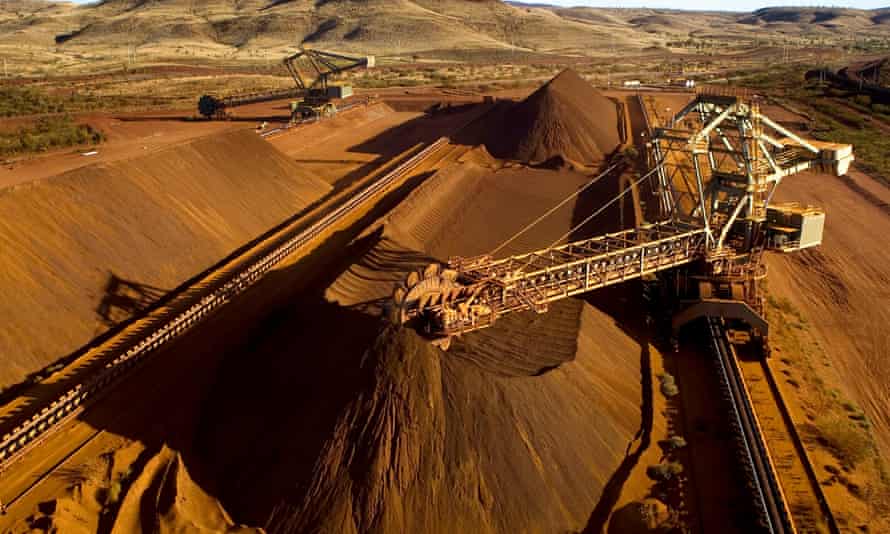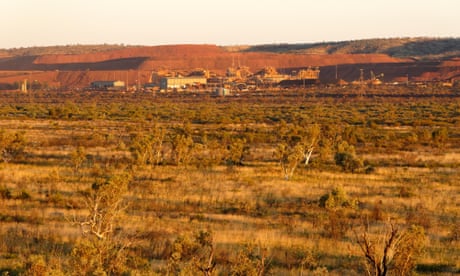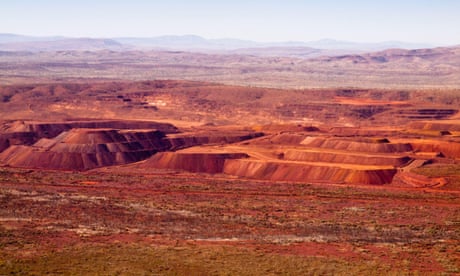Rio Tinto’s alleged underpayment of traditional owners of WA mine area sparks calls for widespread review
Pat Dodson says power imbalance between mining companies and Indigenous communities in Australia should be addressed

The alleged underpayment by Rio Tinto concerns a 1997 agreement over the Yandicoogina iron ore mine in Western Australia.
Photograph: Christian Sprogoe/AFP/Getty Images
Calla Wahlquist
@callapilla
Mon 2 Aug 2021
Senator Pat Dodson has called for a widespread audit of Indigenous land use agreements after traditional owners in the Pilbara found they may have been underpaid by as much as $400m by the mining giant Rio Tinto.
The alleged underpayment concerns a 1997 agreement over the Yandicoogina mine near Newman in Western Australia. Rio Tinto wrote to traditional owners, the Gumala Aboriginal Corporation (GAC), last July informing them it had identified an underpayment issue dating back several years, enclosing a $40m cheque.
The GAC requested a forensic audit, which was delivered last week. According to The Australian, it identified that Rio may have underpaid GAC by as much as $400m over the life of the agreement.
The agreement provided compensation for ground disturbance at the iron ore mine, not a simple royalty payment. The disagreement reportedly centres on Rio’s historically narrow interpretation of what is meant by ground disturbance.

No more welcome to country for Rio Tinto, Indigenous owners say
Rio confirmed it received the audit report last week and said it was in “ongoing talks with Gumala Aboriginal Corporation in an effort to resolve this issue, related to historical payment for infrastructure ground disturbance”.
Dodson said the federal government should properly resource traditional owners and Aboriginal corporations to allow them to detect underpayments.
“It is disconcerting that this incredible underpayment was only discovered as a result of an audit that was prompted by the traditional owners,” he said.
“In light of this, and due to the power imbalance between mining companies and traditional owners, doubt is cast over similar such royalties arrangements, and it’s time for us to consider the need for audits of arrangements across the board.
“The Commonwealth should work with Traditional Owners and their representative corporate bodies to support them to scrutinise such arrangements and detect underpayments.”
Calla Wahlquist
@callapilla
Mon 2 Aug 2021
Senator Pat Dodson has called for a widespread audit of Indigenous land use agreements after traditional owners in the Pilbara found they may have been underpaid by as much as $400m by the mining giant Rio Tinto.
The alleged underpayment concerns a 1997 agreement over the Yandicoogina mine near Newman in Western Australia. Rio Tinto wrote to traditional owners, the Gumala Aboriginal Corporation (GAC), last July informing them it had identified an underpayment issue dating back several years, enclosing a $40m cheque.
The GAC requested a forensic audit, which was delivered last week. According to The Australian, it identified that Rio may have underpaid GAC by as much as $400m over the life of the agreement.
The agreement provided compensation for ground disturbance at the iron ore mine, not a simple royalty payment. The disagreement reportedly centres on Rio’s historically narrow interpretation of what is meant by ground disturbance.

No more welcome to country for Rio Tinto, Indigenous owners say
Rio confirmed it received the audit report last week and said it was in “ongoing talks with Gumala Aboriginal Corporation in an effort to resolve this issue, related to historical payment for infrastructure ground disturbance”.
Dodson said the federal government should properly resource traditional owners and Aboriginal corporations to allow them to detect underpayments.
“It is disconcerting that this incredible underpayment was only discovered as a result of an audit that was prompted by the traditional owners,” he said.
“In light of this, and due to the power imbalance between mining companies and traditional owners, doubt is cast over similar such royalties arrangements, and it’s time for us to consider the need for audits of arrangements across the board.
“The Commonwealth should work with Traditional Owners and their representative corporate bodies to support them to scrutinise such arrangements and detect underpayments.”

Labor senator Pat Dodson says there is a power imbalance between mining companies and traditional owners. Photograph: Mick Tsikas/AAP
The power imbalance between traditional owners and the mining companies with which they have signed partnership agreements is one of the issues being examined by the parliamentary inquiry into the destruction of Juukan Gorge.
Nationals senator Matt Canavan, who sits on that inquiry, also called for the prescribed body corporates that represent native title holders in agreements with industry to be better resourced.
“It’s one thing to pass native title laws but it’s another to make sure that they empower Aboriginal groups to take advantage of a new property right,” Canavan told Guardian Australia.

WA must toughen laws after revelation Rio Tinto dumped priceless Indigenous artefacts, heritage expert says
“A lack of resources to help native title groups, traditional owners, establish native title and and then, as claimants, use their native title for their best interest is something that’s handicapped the full promise of native title rights for decades.”
Canavan said there was “probably a case to look at further resourcing” from the Commonwealth government.
Traditional owners groups are required under the Native Title Act to establish a prescribed body corporate (PBC) to manage and protect the rights and interests of native title holders.
The federal government provides some funding, including a grant program intended to help build the capacity of PBCs, but the bulk of funding comes from compensation agreements struck with the mining industry or other industries that want to use native title land.
Jamie Lowe, a Gundjitmara Djabwurrung man and chief executive of the National Native Title Council, said federal and state governments have heaped regulatory burdens on PBCs without providing adequate resources.
“There’s a huge cultural responsibility, let alone a statutory responsibility under the act,” Lowe said. “So you put those two together, and then you give them zero money, there’s going to be issues bound to happen.
“If that’s not a recipe for disaster I don’t know what it is.”
The regulatory obligations are particularly onerous in the Pilbara, where new developments continually trigger new statutory responsibilities. Lowe said they would become even more difficult if the Western Australian government passes proposed new cultural heritage laws which will rely on the PBCs to take on more work.
“When someone wants to do some activity up the road there, the PBC is not even resourced to employ a person to take a phone call,” Lowe said.
“They say, ‘oh these mob, they don’t know how to govern’ – we put it all on the mob and it’s not on the mob at all. It’s on the operating environment and the legislation that they’re trying to deal with.”
The power imbalance between traditional owners and the mining companies with which they have signed partnership agreements is one of the issues being examined by the parliamentary inquiry into the destruction of Juukan Gorge.
Nationals senator Matt Canavan, who sits on that inquiry, also called for the prescribed body corporates that represent native title holders in agreements with industry to be better resourced.
“It’s one thing to pass native title laws but it’s another to make sure that they empower Aboriginal groups to take advantage of a new property right,” Canavan told Guardian Australia.

WA must toughen laws after revelation Rio Tinto dumped priceless Indigenous artefacts, heritage expert says
“A lack of resources to help native title groups, traditional owners, establish native title and and then, as claimants, use their native title for their best interest is something that’s handicapped the full promise of native title rights for decades.”
Canavan said there was “probably a case to look at further resourcing” from the Commonwealth government.
Traditional owners groups are required under the Native Title Act to establish a prescribed body corporate (PBC) to manage and protect the rights and interests of native title holders.
The federal government provides some funding, including a grant program intended to help build the capacity of PBCs, but the bulk of funding comes from compensation agreements struck with the mining industry or other industries that want to use native title land.
Jamie Lowe, a Gundjitmara Djabwurrung man and chief executive of the National Native Title Council, said federal and state governments have heaped regulatory burdens on PBCs without providing adequate resources.
“There’s a huge cultural responsibility, let alone a statutory responsibility under the act,” Lowe said. “So you put those two together, and then you give them zero money, there’s going to be issues bound to happen.
“If that’s not a recipe for disaster I don’t know what it is.”
The regulatory obligations are particularly onerous in the Pilbara, where new developments continually trigger new statutory responsibilities. Lowe said they would become even more difficult if the Western Australian government passes proposed new cultural heritage laws which will rely on the PBCs to take on more work.
“When someone wants to do some activity up the road there, the PBC is not even resourced to employ a person to take a phone call,” Lowe said.
“They say, ‘oh these mob, they don’t know how to govern’ – we put it all on the mob and it’s not on the mob at all. It’s on the operating environment and the legislation that they’re trying to deal with.”
No comments:
Post a Comment